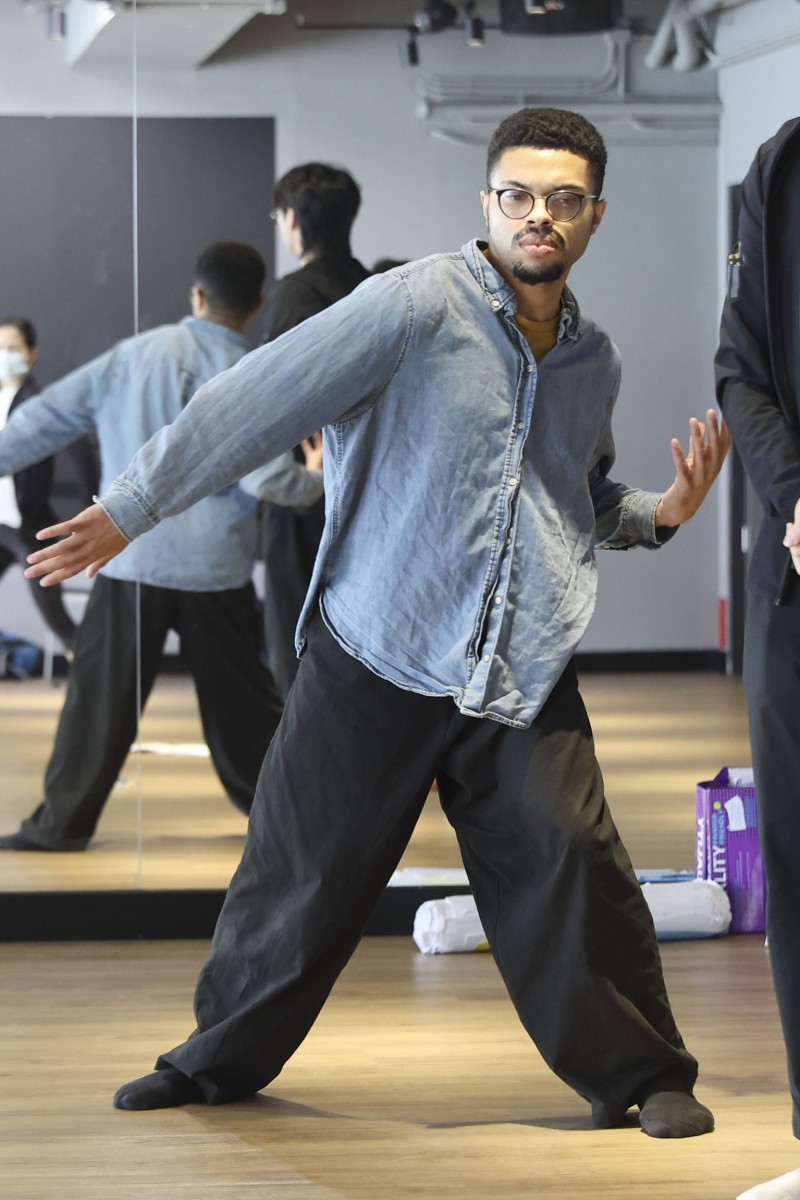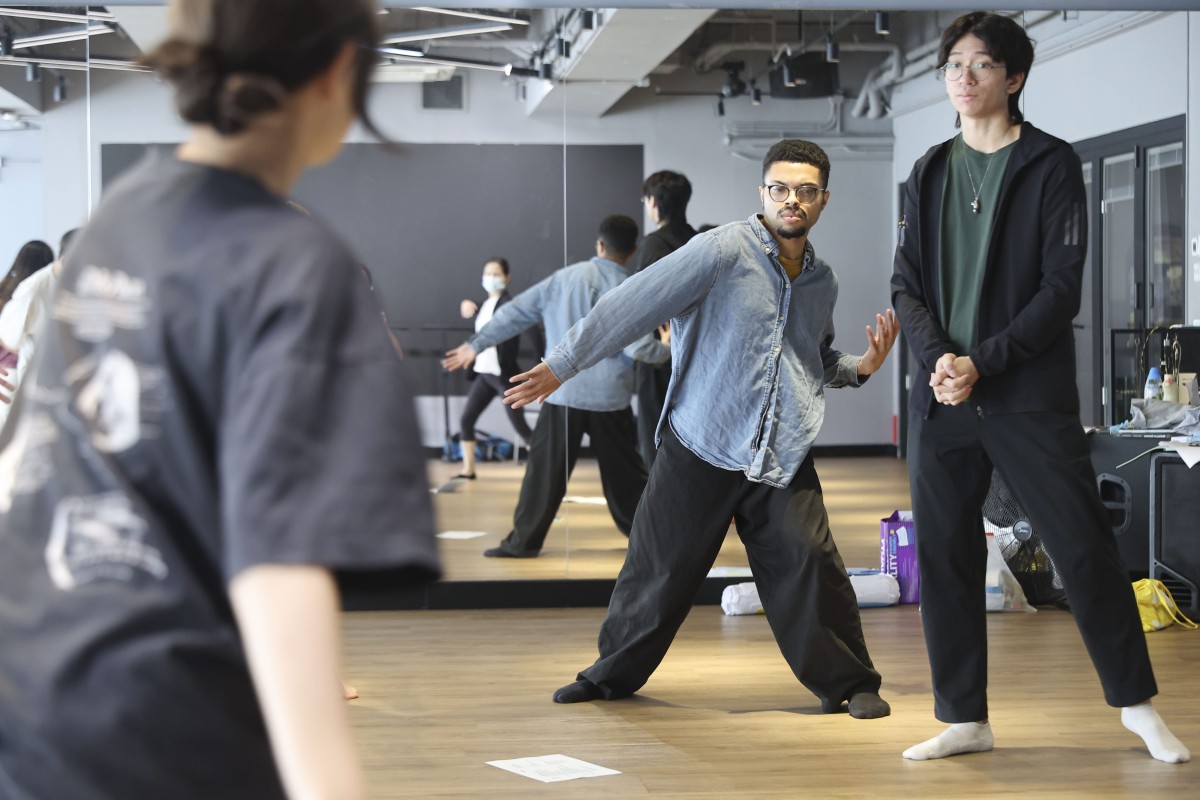
Workshop empowers Hong Kong performing artists to move to inclusivity of disabled people
Programme has changed participants’ approach by introducing language and techniques that understand the needs of disabled performers.
 Dominic Mitchell (centre) is the co-artistic director of London-based Candoco Dance Company. Photo: Edmond So
Dominic Mitchell (centre) is the co-artistic director of London-based Candoco Dance Company. Photo: Edmond SoEvery week, Talking Points gives you a worksheet to practise your reading comprehension with exercises about the story we’ve written
On a weekday afternoon, about a dozen performing artists gathered in Hong Kong for a workshop designed to foster inclusivity and belonging.
Unlike typical performing arts events, these participants used inclusive language. To accommodate everyone regardless of their mobility needs, they said “move in the space” instead of “walking” or “running”.
This workshop series, which ended earlier this month, was part of a two-week residency for Hong Kong’s performing and teaching artists. It focused on inclusive teaching and performance methodologies.
The series was organised by inclusive arts programme No Limits, which aims to create a barrier-free environment for people of different abilities to take part in Hong Kong’s art scene. The programme invited Candoco Dance Company from Britain to lead the workshops.
The workshops were led by Candoco’s co-artistic director, Dominic Mitchell, and Candoco’s teaching artist, Paulina Porwollik. They combined practical exercises with disability theory and advocacy, focusing on adaptability, communication and lesson planning for disabled and non-disabled students.
“We think of inclusive performing arts as a way to centre the experience of disabilities and intersectional identities, understanding the barriers that people face,” Mitchell said.
Through these practices, participants explored their artistic expression while learning from diverse experiences and breaking down barriers. The workshops hoped to challenge how the performing arts industry thinks about inclusivity.
“A more inclusive and integrated experience allows everyone to feel comfortable, express themselves freely, and explore artistic expression while gaining a deeper understanding of themselves in relation to others,” Mitchell noted.
How sign language and dance have helped Deaf performer express himself
More inclusivity in the performing arts scene
One participant, Kelvin Chan, has been working as an instructor at Playback Theatre in Hong Kong for more than a decade.
Playback Theatre specialises in a form of improvisational storytelling where audiences share personal stories, which performers enact on stage.
Chan joined the No Limits workshops to enhance his work with people of different abilities.
“I’ve always collaborated with people with intellectual disabilities or those who are neurodivergent, so I’m curious about how these methods can help me in my regular work,” he said.
The programme was also useful for his work with the elderly. He teaches improvisational theatre to senior citizens, helping them improve their well-being, especially for those experiencing cognitive decline.
The instructor was particularly inspired by the inclusive language used in the workshop: “The word ‘move’ applies to people in wheelchairs or those with varying mobility ... That really struck me.”
He also shared how simple changes in language, like replacing “raise your hands” with “uplift” or “lift your upper body”, could make instructions more inclusive.
Chan added that the workshop provided a rare chance for people working with disabled individuals to come together and learn from different perspectives.
“It’s inspiring and fruitful to see how others approach the exercises or use them in their work,” he said.
A barrier-free environment for artists
Mitchell shared a key aspect of Candoco’s teaching philosophy: every class is an offering of knowledge and an invitation for deeper understanding. He saw the workshops as a two-way conversation, where disabled dancers shared their insight with non-disabled dancers, and vice versa.
Mitchell explained that Candoco also focused on rethinking techniques that have not historically been inclusive and contemplating how they can be adjusted for students of all abilities.
“We encourage dancers, teachers and artists to take what resonates with them and leave behind what may not be useful at that moment,” the artist said.
“It’s essential for us to be in a mode of sharing rather than imposing a single approach, as there are many ways to be inclusive.”
He also highlighted the importance of nuanced communication and understanding different cultures.
“The main challenges are finding the time and space to understand the cultural context we’re working in, especially regarding translation ... However, I see these challenges as exciting opportunities,” he said.
Dyslexic teen helping others with the learning disability learn Chinese characters more easily
While the performing arts sector has become more aware of the need for inclusivity, Mitchell said there was “still a long way to go”.
“Our vision is to remove all barriers to ensure everyone can participate in the performing arts,” he said.
Carly Wong, marketing manager at No Limits, noted that the group nurtured many talented disabled artists, but the city still lacked sufficient training and resources to support them.
“The assumption that disabled individuals choose less demanding careers reflects a misconception about their abilities; many are fully capable of pursuing their dreams,” she said.
To test your understanding of this story, download our printable worksheet or answer the questions in the quiz below.
